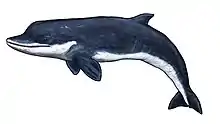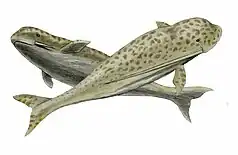Finless porpoise
Neophocaena is a genus of porpoise native to the Indian and Pacific oceans, as well as the freshwater habitats of the Yangtze River basin in China. They are commonly known as finless porpoises. Genetic studies indicate that Neophocaena is the most basal living member of the porpoise family.[2]
| Finless porpoise | |
|---|---|
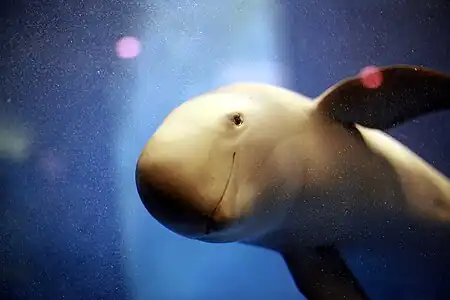 | |
| Neophocaena sunameri at Miyajima Public Aquarium | |
| Scientific classification | |
| Domain: | Eukaryota |
| Kingdom: | Animalia |
| Phylum: | Chordata |
| Class: | Mammalia |
| Order: | Artiodactyla |
| Infraorder: | Cetacea |
| Family: | Phocoenidae |
| Genus: | Neophocaena Palmer, 1899 |
| Type species | |
| Delphinus phocaenoides [1] Cuvier, 1829 | |
| Species | |
|
Neophocaena asiaeorientalis | |
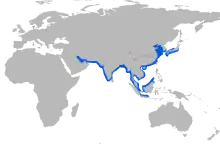 | |
| For all three finless porpoise species | |
There are three species in this genus:[3][4]
| Image | Scientific name | Common name | Distribution |
|---|---|---|---|
 |
Neophocaena asiaeorientalis | Yangtze finless porpoise | Yangtze River basin in China |
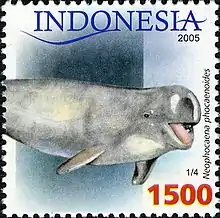 |
Neophocaena phocaenoides | Indo-Pacific finless porpoise | Persian Gulf east to the Taiwan Strait, south to Indonesia |
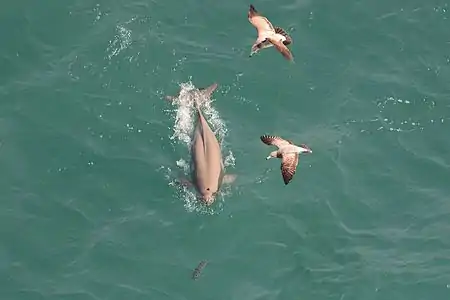 |
Neophocaena sunameri | East Asian finless porpoise | Taiwan Strait north to the Yellow Sea, east to the east coast of Japan |
Description
The finless porpoises are the only porpoises to lack a true dorsal fin. Instead there is a low ridge covered in thick skin bearing several lines of tiny tubercles. In addition, the forehead is unusually steep compared with those of other porpoises. With fifteen to twenty-one teeth in each jaw, they also have, on average, fewer teeth than other porpoises, although there is some overlap, and this is a not a reliable means of distinguishing them.[5] Finless porpoises in Ariake Sound-Tachibana Bay showed ontogenctic and seasonal variations in diet. The mean length at weaning was estimated to be 101 cm, corresponding to approximately 6 months of age. Calves fed on small-sized demersal fish and cephalopods. [6]
References
- Wilson, D. E.; Reeder, D. M., eds. (2005). Mammal Species of the World: A Taxonomic and Geographic Reference (3rd ed.). Johns Hopkins University Press. ISBN 978-0-8018-8221-0. OCLC 62265494.
- Rosel, P. E.; et al. (1995). "Phylogenetic relationships among the true porpoises (Cetacea: Phocoenidae)". Molecular Phylogenetics and Evolution. 4 (4): 463–474. doi:10.1006/mpev.1995.1043. PMID 8747302.
- Mammal Diversity Database (2021-08-10), Mammal Diversity Database, retrieved 2021-08-28
- "Finless Porpoises: Neophocaena phocaenoides, N. asiaeorientalis". Encyclopedia of Marine Mammals: 372–375. 2018-01-01. doi:10.1016/B978-0-12-804327-1.00129-1.
- Jefferson, T. A.; Hung, S. K. (2004). "Neophocaena phocaenoides". Mammalian Species. 746: 1–12. doi:10.1644/746. S2CID 198125391.
- Shirakihara, Miki; Seki, Kenji; Takemura, Akira; Shirakihara, Kunio; Yoshida, Hideyoshi; Yamazaki, Takeshi (2008-10-01). "Food Habits of Finless Porpoises Neophocaena phocaenoides in Western Kyushu, Japan". Journal of Mammalogy. 89 (5): 1248–1256. doi:10.1644/07-MAMM-A-264.1. ISSN 0022-2372.
